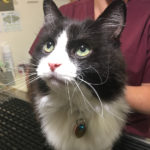Canine parvovirus (CPV) is a life threatening gastrointestinal disease that continues to be prevalent in the dog population.
There is a very effective vaccine that is given as a course to puppies and on a regular annual or triennial basis to adult dogs. Unfortunately many dogs in our community are not regularly immunised and so can carry and spread this disease. We have worryingly seen several cases of CPV in young puppies at our clinic in the past few weeks.
The typical signs of CPV are severe vomiting, bloody diarrhea, lethargy and inappetance. Without intensive medical care the disease is often fatal. CPV is spread via contact with dog faeces, is highly contagious and the virus can survive prolonged periods in the environment. The virus damages rapidly dividing cells in the body including the intestine, bone marrow and heart. A faecal test can be used in the early stages of the disease to confirm the diagnosis.
Treatment involves intensive care in hospital for many days with a guarded prognosis for recovery. Intravenous fluids, anti-vomiting medication, antibiotics and pain relief are needed.
Prevention includes ensuring your puppy has its full course of vaccines and is then vaccinated regularly as an adult. Avoid walking your puppy on the street or visiting parks and beaches until after the final puppy vaccine has been given. Socialise your puppy in a safe environment such as Puppy Preschool or at home with animals that are regularly immunised.
Along with parvovirus, dogs should also be vaccinated against distemper, hepatitis and canine cough. Contact us to check if your pet is currently protected from disease. This is Maxi the Pomeranian puppy who is fully vaccinated and graduated from Puppy Preschool.




